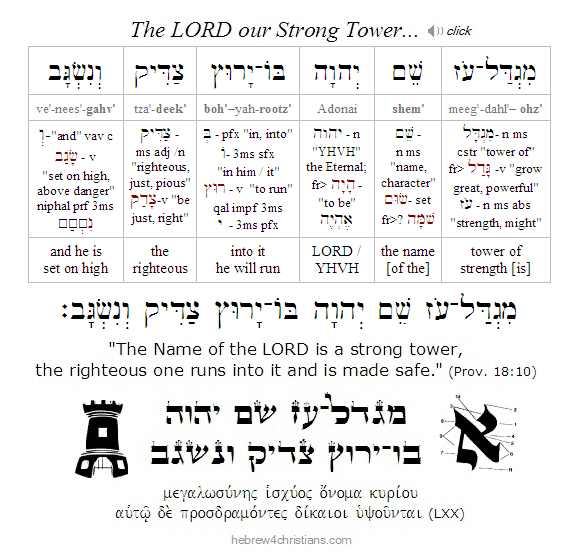Migdal-Oz Shem Adonai
The Name of the LORD is a Strong Tower
The name of the LORD is a strong tower;
the righteous one runs into it and is made safe. (Proverbs 18:10)


IN THE BIBLE there is one name that occurs far more than all the others combined, and that is the personal Name of the God of Israel: YHVH (sometimes rendered YHWH). Because it is composed from the Hebrew consonants Yod, Hey, Vav, and Hey, it is also referred to as the "Tetragrammaton," which simply means "the four letters." In our English Bibles, YHVH is generally translated as "the LORD" (all capitals).
Learn Hebrew
The word "God" first appears in Genesis 1:1 (bereshit bara elohim ŌĆō "in the beginning God created..."), which denotes His creative power over the cosmos, but the personal name "YHVH" first appears in Genesis 2:4, where the LORD God (YHVH elohim) formed Adam from the dust of the ground and breathed into his nostrils "the breath of life" (nishmat chayim). According to some Rabbis, the name Elohim is therefore associated with God's role as Creator and Judge, whereas the Name YHVH is associated with his life-giving mercy and Salvation.
The Name of YHVH was further revealed when God commissioned Moses to be Israel's liberator from the bondage of Pharaoh's Egypt (see Exodus 3:14). When asked for His Name, God simply said, ehyeh asher ehyeh (rendered as "I am who I am" in the KJV), a phrase that comes from the Hebrew verb "to be" (hayah), and indicating a connection between YHVH and being itself. Indeed, according to traditional Judaism, YHVH is said to be derived from the phrase hayah hoveh yi'yeh, "He was, He is, He will be," indicating that God is before all our predications as the Source of all life.
In the rabbinic tradition, the sacred Name of YHVH is kadosh ŌĆō never to be said lightly ŌĆō and is replaced by the word "Adonai" (Lord) or "Hashem" (the Name). In fact, the Name YHVH was only to be uttered by the kohen gadol (High Priest) on the holiest day of the Jewish year (Yom Kippur) while standing in kodesh hakodashim (the Holy of Holies) of the Jewish Temple (Yoma 39b). A rabbinical midrash states that only seven kohanim (priests) now know how to pronounce this Name, a secret that is being handed down until the Third Temple is rebuilt in Jerusalem.
In this verse, the name of YHVH is likened to a migdal oz - the "strong tower" that was used as the chief fortification for a city in ancient times. For the tzaddik ŌĆō the righteous man who calls upon the Name of the LORD ŌĆō God is an all-powerful defense in times of peril. The metaphor suggests a righteous man running into an immensely fortified tower, being elevated high above the surrounding danger (nisgav comes from a verb that means to elevate to an inaccessibly high place). The LORD is a tower of refuge for those who put their trust in Him.

The Hebrew name Yehoshua (ūÖūöūĢū®ūüūĢūó), or "Joshua," derives from a combination of YHVH and the verb yasha (ūÖū®ūüūó), to save," meaning "YHVH saves." Later Yehoshua was shortened to Yeshua (ūÖū®ūüūĢūó; see Nehemiah 8:17), which is the Hebrew name for "Jesus," of course. As a "type" of Joshua, Jesus exemplifies the ultimate deliverance of His people by taking Israel into the land to inherit the promises. Indeed, calling upon the Name of the Yeshua is to call upon the Name of YHVH, since Yeshua himself is YHVH come in the flesh (Isa 9:6; Isa 45:23; Phil 2:11; Rom 10:9). There is no other name given to mankind for salvation (Acts 4:12, Isa 43:11).

Who has ascended to heaven and come down?
Who has gathered the wind in his fists?
Who has wrapped up the waters in a garment?
Who has established all the ends of the earth?
What is his name, and what is his son's name?
Surely you know! (Prov 30:4).
Hebrew Analysis:

Hebrew for Christians
Copyright © John J. Parsons
All rights reserved.